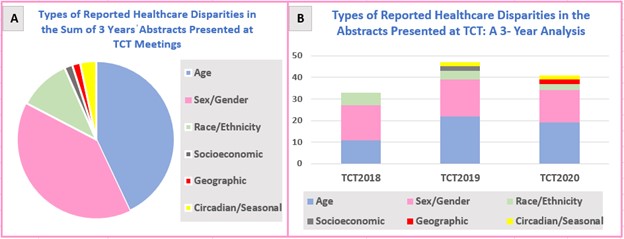Lots of interesting abstracts and cases were submitted for TCTAP 2022. Below are the accepted ones after a thorough review by our official reviewers. Don’t miss the opportunity to expand your knowledge and interact with authors as well as virtual participants by sharing your opinion in the comment section!
TCTAP A-076
Highlighting Healthcare Disparities in the Scientific Contributions Presented at Transcatheter Cardiovascular Therapeutics Meetings: Are We Paying Enough Attention?
By Zainab Dakhil
Presenter
Zainab Dakhil
Authors
Zainab Dakhil1
Affiliation
Ibn Al-Bitar Hospital, Iraq1
View Study Report
TCTAP A-076
Quality, Guidelines and Appropriateness Criteria
Highlighting Healthcare Disparities in the Scientific Contributions Presented at Transcatheter Cardiovascular Therapeutics Meetings: Are We Paying Enough Attention?
Zainab Dakhil1
Ibn Al-Bitar Hospital, Iraq1
Background
Cardiology meetings play critical role in disseminating knowledge and professional advancement through shedding light on crucial aspects in cardiology. No available data on landscape of themes that were highlighted by these meetings. Considering the concerning impact of healthcare disparities(HCD) globally especially in cardiovascular interventions, we sought to investigate the reporting of HCD in TCT abstracts in 2018-2020.
Methods
Cross-sectional analysis of TCT published abstracts in special supplement issues in JACC(2018-2020), abstracts were screened from both title and abstract text to assess if the main focus was to address HCD (age, gender/sex, race/ ethnicity, socioeconomic, geographic or circadian/seasonal). If the abstract highlighted more than one HCD then we counted each disparity separately without merging of data.
Results
Total number of analyzed abstracts was 2158, among which 121(5.6%) addressed HCD. Abstracts focusing on HCD were 3.84%,5.69% and 8.36% in 2018, 2019 and 2020 respectively. Among the HCD abstracts; age disparity was the most reported HCD(42.97%) followed by sex/gender and race/ethnicity HCD(39.66% and 10.74%) respectively, see Fig A. Sex/gender was the most reported HCD in TCT2018(48.48%), age was most reported HCD in TCT2019 (46.8 %) and TCT2020 (46.34%), see Fig B.


Conclusion
Highlighting HCD in TCT was doubled from 2018 to 2020 with age being the most reported HCD while addressing socioeconomic and geographic HCD continued to be limited. As population diversity increases, researchers need to focus on HCD and design interventions to overcome them, specifying sessionˈ categories in high impact cardiology meetings can help to attract the attention of researchers and stakeholders to achieves this objective.


